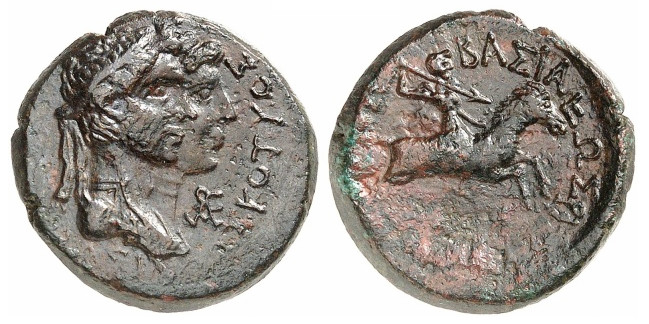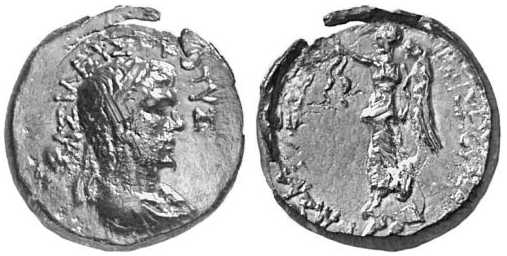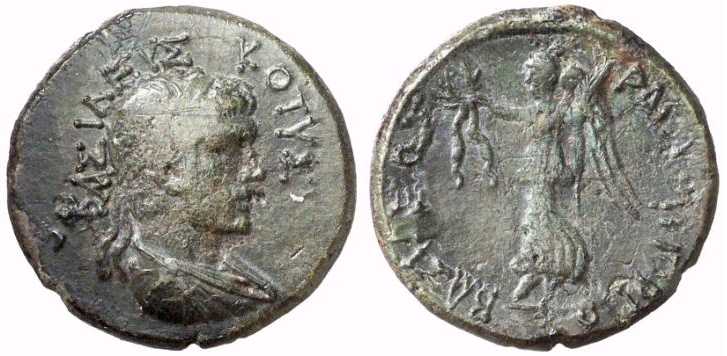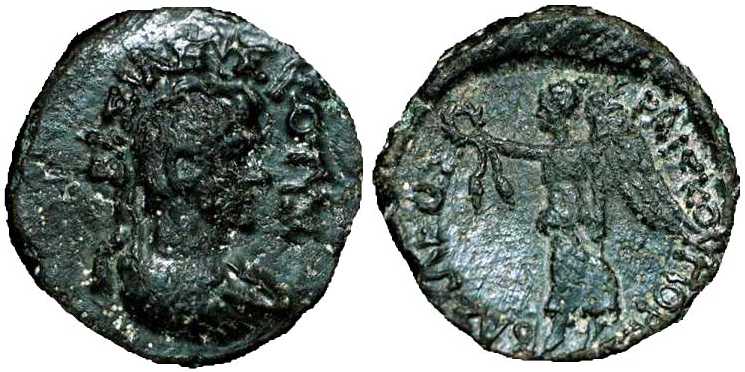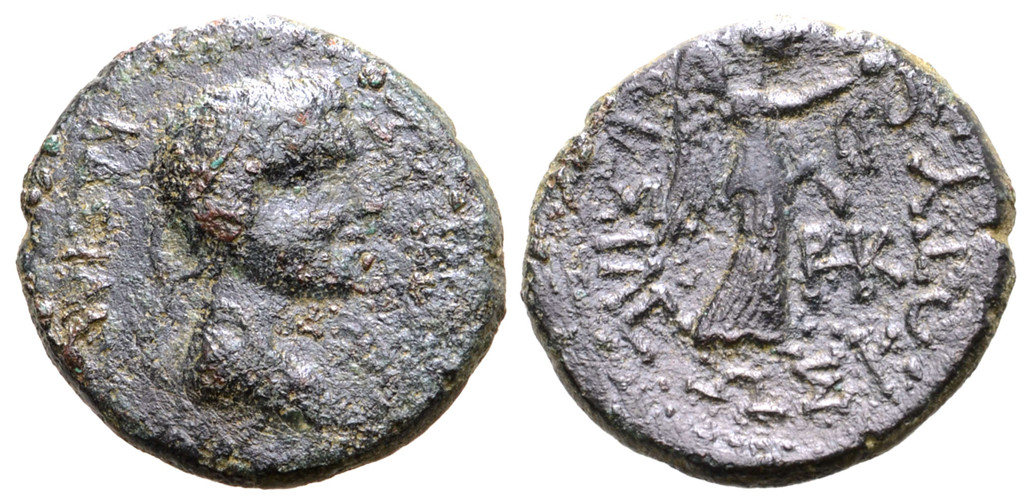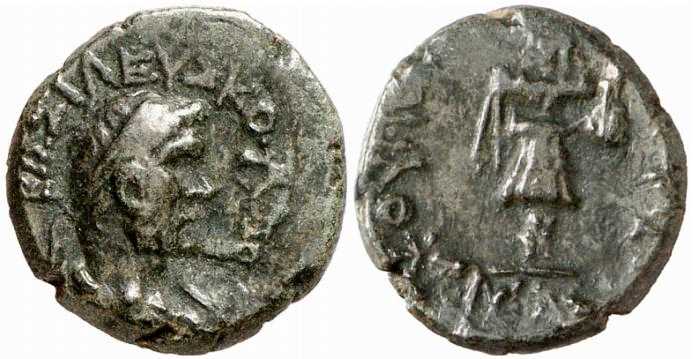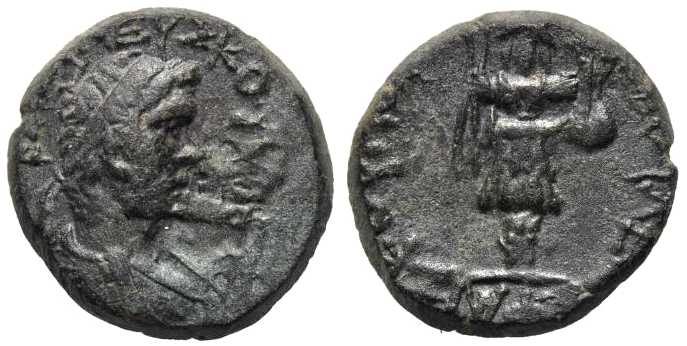Tacitus
Annales - Book II: War in Thrace 19 AD
Translated by Alfred John Church and William Jackson Brodribb
64. Tidings having
also
arrived of Artaxias being made king of Armenia by Germanicus, the
Senate decreed that both he and Drusus should enter the city with an
ovation. Arches too were raised round the sides of the temple of Mars
the Avenger, with statues of the two Caesars. Tiberius was the more
delighted at having established peace by wise policy than if he had
finished a war by battle. And so next he planned a crafty scheme
against Rhescuporis, king of Thrace. That entire country had been in
the possession of Rhoemetalces, after whose death Augustus assigned
half to the king's brother Rhescuporis, half to his son Cotys. In this
division the cultivated lands, the towns, and what bordered on Greek
territories, fell to Cotys; the wild and barbarous portion, with
enemies on its frontier, to Rhescuporis. The kings too themselves
differed, Cotys having a gentle and kindly temper, the other a fierce
and ambitious spirit, which could not brook a partner. Still at first
they lived in a hollow friendship, but soon Rhescuporis overstepped his
bounds and appropriated to himself what had been given to Cotys, using
force when he was resisted, though somewhat timidly under Augustus, who
having created both kingdoms would, he feared, avenge any contempt of
his arrangement. When however he heard of the change of emperor, he let
loose bands of freebooters and razed the fortresses, as a provocation
to war.
65. Nothing made
Tiberius so uneasy as an apprehension of the disturbance of any
settlement. He commissioned a centurion to tell the kings not to decide
their dispute by arms. Cotys at once dismissed the forces which he had
prepared. Rhescuporis, with assumed modesty, asked for a place of
meeting where, he said, they might settle their differences by an
interview. There was little hesitation in fixing on a time, a place,
finally on terms, as every point was mutually conceded and accepted, by
the one out of good nature, by the other with a treacherous intent.
Rhescuporis, to ratify the treaty, as he said, further proposed a
banquet; and when their mirth had been prolonged far into the night,
and Cotys amid the feasting and the wine was unsuspicious of danger, he
loaded him with chains, though he appealed, on perceiving the perfidy,
to the sacred character of a king, to the gods of their common house,
and to the hospitable board. Having possessed himself of all Thrace, he
wrote word to Tiberius that a plot had been formed against him, and
that he had forestalled the plotter. Meanwhile, under pretext of a war
against the Bastarnian and Scythian tribes he was strengthening himself
with fresh forces of infantry and cavalry. He received a conciliatory
answer. If there was no treachery in his conduct, he could rely on his
innocence, but neither the emperor nor the Senate would decide on the
right or wrong of his cause without hearing it. He was therefore to
surrender Cotys, come in person transfer from himself the odium of the
charge.
66. This letter
Latinius
Pandus, propraetor of Moesia, sent to Thrace, with soldiers to whose
custody Cotys was to be delivered. Rhescuporis, hesitating between fear
and rage, preferred to be charged with an accomplished rather than with
an attempted crime. He ordered Cotys to be murdered and falsely
represented his death as self-inflicted. Still the emperor did not
change the policy which he had once for all adopted. On the death of
Pandus, whom Rhescuporis accused of being his personal enemy, he
appointed to the government of Moesia, Pomponius Flaccus, a veteran
soldier specially because of his close intimacy with the king and his
consequent ability to entrap him.
67. Flaccus, on
arriving
in Thrace induced the king by great promises, though he hesitated and
thought of his guilty deeds, to enter the Roman lines. He then
surrounded him with a strong force under pretence of showing him
honour, and the tribunes and centurions, by counsel, by persuasion, and
by a more undisguised captivity the further he went, brought him, aware
at last of his desperate plight, to Rome. He was accused before the
Senate by the wife of Cotys, and was condemned to be kept a prisoner
far away from his kingdom. Thrace was divided between his son
Rhoemetalces, who, it was proved, had opposed his father's designs, and
the sons of Cotys. As these were still minors, Trebellienus Rufus, an
ex-praetor, was appointed to govern the kingdom in the meanwhile, after
the precedent of our ancestors, who sent Marcus Lepidus into Egyptas
guardian to Ptolemy's children. Rhescuporis was removed to Alexandria,
and there attempting or falsely charged with attempting escape, was put
to death.
|
 . [Youroukova, 1976; RPC I, 2006, p. 312-313]
. [Youroukova, 1976; RPC I, 2006, p. 312-313]